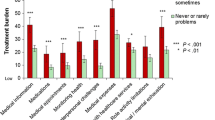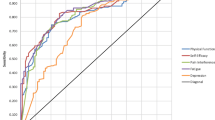Abstract
Objective:The purpose of this study was to explore the relationships among patients’ perceptions about the roles they played during medical visits, their subsequent attitudes about their illnesses and treatments, and their self-rated improvement.
Design:Questionnaires were completed by patients before, one day after, and one week after their medical visits, and by their physicians following the visits.
Setting:The study was conducted in a general internal medicine faculty practice that provided adult primary care to a largely HMO population.
Participants:Adult patients with new or increased symptoms who were capable of reading and understanding the study questionnaire.
Main results:Fifty-five patients (47%) reported playing an active role; 62 patients (53%) reported playing a passive role. After adjusting for age, sex, baseline illness ratings, and physician-rated prognosis, “active” patients reported less discomfort (p=0.04), greater alleviation of symptoms (p=0.008), and more improvement in their general medical condition (p=0.04) one week after the visits than did “passive” patients. These differences were not influenced by the roles patients desired to play. Active patients also reported less concern with their illnesses (p=0.04), a greater sense of control of their illnesses (p=0.04), and more satisfaction with their physicians (p=0.02) one day after the visit. Post-visit dysfunction ratings were not related to patients’ role perceptions.
Conclusions:Patients’ perceptions about their involvement in care appeared to be related to their attitudes about their illnesses as well as to recovery. Further research is needed, however, to determine the factors that influence these role perceptions and to define the types of patients, illnesses, and settings in which the benefits of active-role perceptions are most likely to be realized.
Similar content being viewed by others
References
Lazare A, Eisenthal S, Wasserman L. The customer approach to patienthood. Arch Gen Psychiatry. 1975;32:553–8.
Brody D. The patient’s role in clinical decision-making. Ann Intern Med. 1980;93:718–22.
Lidz C, Meisel A. Informed consent and the structure of medical care. U.S. Government Printing Office. 1982;2:317–410.
Strull WM, Lo B, Charles G. Do patients want to participate in medical decision making? JAMA. 1984;252:2990–4.
Ende J, Kazis L, Ash A, Moskowitz MA. Measuring patients’ desire for autonomy: decision making and information-seeking preferences among medical patients. J Gen Intern Med. 1989;4:23–30.
Cassileth B, Zupkis RV, Sutton-Smith K, March V. Information and participation preferences among cancer patients. Ann Intern Med. 1980;92:832–6.
Greenfield S, Kaplan S, Ware J. Expanding patient involvement in care. Ann Intern Med. 1985;102:520–8.
Greenfield S, Kaplan S, Ware J, Yano E, Frank H. Patients’ participation in medical care: effects on blood sugar control and quality of life in diabetes. J Gen Intern Med. 1988;3:448–57.
Roter DL. Patient participation in the patient provider interaction: the effects of patient question asking on the quality of interaction, satisfaction and compliance. Health Education Monograph. 1977;5:281–315.
Ware JE, Snyder MK, Wright WR. Development and validation of scales to measure patient satisfaction with health care services. Springfield, VA: National Technical Information Service, 1976. NTIS publication no. (PB) 288-330.
Schulman B. Active patient orientation and outcomes in hypertensive treatment. Med Care. 1979;17:267–80.
Brody D, Miller S. Illness concerns and recovery from a URI. Med Care. 1986;24:742–8.
Miller SM, Combs C, Stoddard E. Information, coping and control in patients undergoing surgery and stressful medical procedures. In: Steptoe A, Appels GA, eds. Stress, personal control and health. Chichester, England: Wiley; in press.
Bowers KS. Pain, anxiety, and perceived control. J Consult Clin Psychol. 1968;32:596–602.
Pennebaker JW, Burnam A, Schaeffer MA, Harper DC. Lack of control as a determinant of perceived physical symptoms. J Pers Soc Psychol. 1977;35:167–74.
Imboden JB. Psychosocial determinants of recovery. Adv Psychosom Med. 1972;8:142–55.
Bandura A. Self-efficacy: toward a unifying theory of behavioral change. Psychol Rev. 1977;84:191–215.
Bandura A. The assessment and predictive generality of self-percepts of efficacy. J Behav Ther Exp Psychiatry. 1982;13:195–9.
Szasz TS, Hollender MFH. A contribution to the philosophy of medicine: the basic models of the doctor-patient relationship. Arch Intern Med. 1956;97:585–92.
Author information
Authors and Affiliations
Additional information
Supported by the Henry J. Kaiser Family Foundation, the Robert Wood Johnson Foundation, and the Temple University Research Incentive Fund.
Rights and permissions
About this article
Cite this article
Brody, D.S., Miller, S.M., Lerman, C.E. et al. Patient perception of involvement in medical care. J Gen Intern Med 4, 506–511 (1989). https://doi.org/10.1007/BF02599549
Issue Date:
DOI: https://doi.org/10.1007/BF02599549




